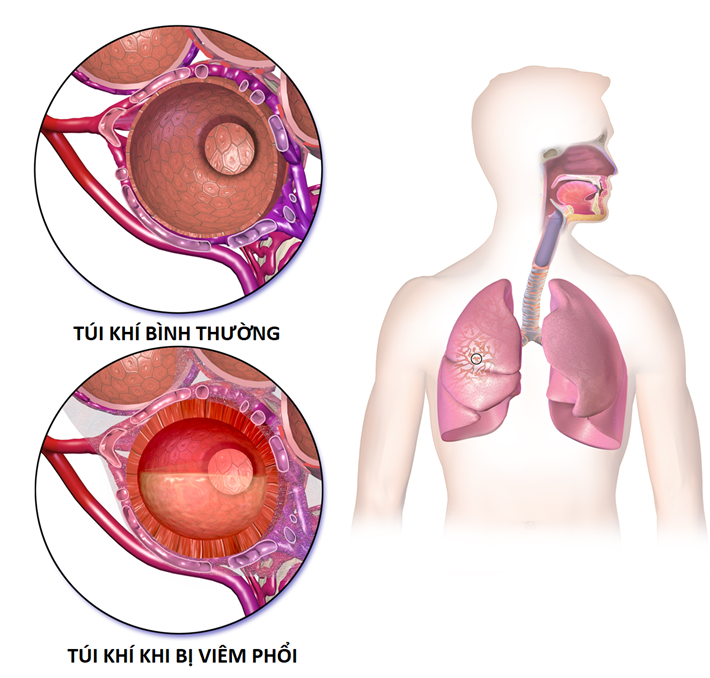Pneumonia - The leading cause of death in children
November 12 every year has been selected as World Pneumonia Day. This is the cause of death among children in Vietnam and around the world. According to the latest statistics of the World Health Organization (WHO), in 2015, pneumonia killed 920,136 children under 5 years old, accounting for 16% of all children dying at this age.

8/29/2018 9:07:36 AM
1. What is pneumonia? The symptoms are common and the subject is susceptible to pneumonia
Definition of pneumonia:
Pneumonia is a disease of the respiratory system. With pneumonia, tissue of one or both of the lungs will swell (inflammation). At the end of the airway are small clusters of air bags, the swollen lung phenomenon increases secretion and leaves dead cells, causing the small air sac clusters to become blocked.
Small air sacs are blocked by secretions and dead cells, making it extremely difficult for the patient to breathe
Symptom: Common symptoms of lung tablets:
-
Coughing is often accompanied by a feeling of dry throat / yellow, green, or bloody sputum.
-
Shortness of breath.
-
Arrhythmic heartbeat.
-
Fever.
-
feeling tired, drowsy.
-
Sweating and shivering often.
-
Does not feel delicious.
-
Chest pain when normal and worsened by breathing or coughing.
Less common symptoms:
-
Hemoptisi.
-
Headache.
-
Tired.
-
Nausea.
-
Wheeze.
-
Joint and muscle pain.
-
Feeling dizzy and disoriented, especially in the elderly.
Object: In fact, anyone can be a target of pneumonia. However, some people are at higher risk of getting sick and pneumonia becomes dangerous for them as well. Specifically:
-
Children under 5 years old.
-
Adults over 65 years old.
-
Suffering from chronic diseases: heart failure, diabetes, COPD, ...
-
People with HIV / AIDS.
-
People are in chemotherapy.
-
People undergoing hematopoietic or marrow stem cell transplants.
2. Dangerous complications of pneumonia
Pneumonia ranges from mild to severe. In severe cases, the disease can cause complications:
Complications of pneumonia are very complicated, can be highly fatal if not treated promptly
- Blood infection: The bacteria from the lungs can enter the bloodstream and from there enter other internal organs. This is a complication of pneumonia that is difficult to treat as well as potentially fatal.
- Lung abscess: This complication will cause pus swelling in the lungs. At the same time, lung tissue becomes necrotic and forms cavities of necrotic debris or fluid.
- Kidney failure: The bacteria can enter the bloodstream into the kidneys, thereby causing the organ to weaken and possibly stop working completely.
Respiratory failure: This is a common complication of pneumonia. This complication can get worse over time. If not treated in time, this complication will cause the patient's death.
- Pleural aneurysm, meningitis and pleuritis: When these complications appear, the patient will be extremely uncomfortable when breathing. If the fluid contains a virus, meningitis will occur, causing permanent brain damage or death.
3. Causes of pneumonia
|
Cause |
Category |
Description |
|
Bacteria |
- Legionella pneumophila: Related to exposure to polluted water. - Mycoplasma pneumoniae:
- Chlamydia pneumoniae:
|
Bacterial pneumonia may appear on its own (usually at the time of season) or develop after you have a cold. Bacterial pneumonia usually affects only one area of the lungs. |
|
Virus |
- Respiratory syncytial virus (RSV). - Virus rhinovirus and parainfluenza (HPIV). - Human virus (HMPV). |
- Most cases of viral pneumonia are mild. - Viral pneumonia can resolve on its own after 1-3 weeks. - Only a few serious cases require hospital treatment
|
|
Fungus |
- The most common fungal pneumonia is Pneumocystis. - Occurs in people with weakened immune systems due to:
|
Fungal pneumonia is often severe and has serious complications. |
4. How to prevent pneumonia
4.1. Vaccines:
Vaccines can prevent bacterial or viral causes of pneumonia. Although vaccines cannot prevent all cases, this method has many benefits such as:
-
Milder infections.
-
Less time for pneumonia.
-
Less serious complications.
|
Vaccine |
Subjects |
|
Pneumococcal lung vaccine |
- Adults 65 years of age and older. - People with chronic illnesses, serious long-term health problems, or weak immune systems. - Smokers. - Children under 5 years old. Children over 5 years old with certain diseases such as heart disease, lung disease or cancer. |
|
Vaccine flu |
Everyone |
|
Vaccine Hib |
Child under 5-year olds |
Note: Consult a specialist before getting vaccinated.
4.2. Wash your hands with reputable products:
Hand washing is the simplest and most economical method available today. To protect your health, remember to always wash your hands with reputable products when:
-
After going to the toilet.
-
After sneezing.
-
Before eating.
4.3. Have a healthy lifestyle:
Besides minimizing the leading cause of pneumonia - smoking, you also need to include vitamins and fiber in your daily meals. At the same time, exercise regularly to help increase your natural immunity.
Increasing vitamins through fruit helps to keep your body healthy
CarePlus International Clinic is operated by CityClinic Vietnam Company Limited. Besides, he is also a member of Singapore Medical Group (SMG) - a leading healthcare provider in Singapore.
Besides examination, in-depth diagnosis and treatment of lung diseases, CarePlus Respiratory Department also offers other services such as:
-
Examination, diagnosis and treatment of common respiratory diseases.
-
Join the consultation, combined with the specialist Neurology.
-
Health consultation and education.
To view details of CarePlus Respiratory Department services, please visit AT PH.
Pneumonia is a disease with a complicated process. This disease can cause death or leave many dangerous complications if not treated promptly. Therefore, when there are any symptoms of pneumonia, it is necessary to see a specialist for prompt treatment, to avoid danger to your life.